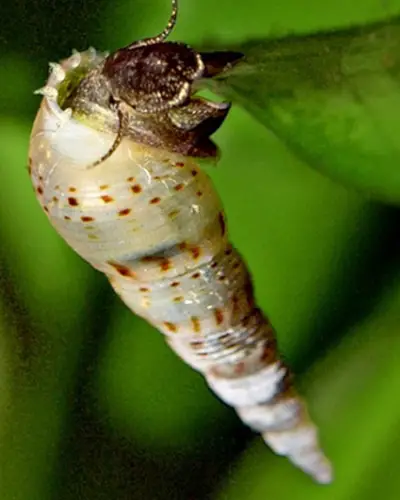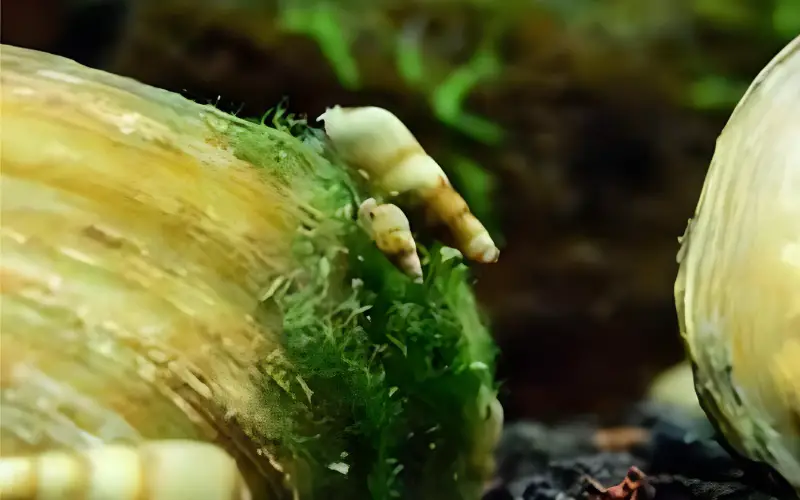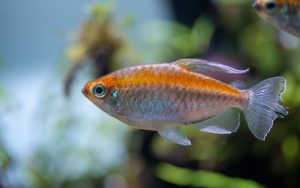They’re small, they’re shelled, and they’re often touted as the ultimate cleanup crew for your aquarium – but are trumpet snails all they’re cracked up to be? Do trumpet snails clean aquariums? This question sparks endless debate amongst aquarium enthusiasts.
While these little guys are undeniably fascinating to watch as they burrow and glide through the substrate, their effectiveness as a cleaning crew is often shrouded in myths and misconceptions.
The truth is that trumpet snails can play a role in maintaining a healthy aquarium environment, but they’re not the magical solution some make them out to be.
Before you invest in a whole army of these shelled wonders, it’s crucial to separate fact from fiction.

We’re diving deep to debunk 5 of the most common myths surrounding trumpet snails and their cleaning capabilities.
So, buckle up and get ready to discover the real deal about these intriguing little inhabitants of the underwater world!
Table of Contents
ToggleDo Trumpet Snails Clean Aquariums?
Trumpet snails, also known as Malaysian trumpet snails (MTS), are a common sight in many freshwater aquariums. These aquatic invertebrates are excellent bottom feeders and can help keep an aquarium clean by consuming detritus, uneaten fish food, and soft algae.
Will trumpet snails clean aquarium? While not a complete solution, Trumpet snails can be valuable additions to your aquarium cleanup crew thanks to their impressive appetites.

As natural scavengers, they spend their days burrowing through the substrate, consuming leftover fish food, decaying plant matter, and other organic debris that would otherwise contribute to poor water quality. Their constant munching helps keep your tank clean and can reduce the need for frequent manual cleaning.
They are especially beneficial in a planted tank, as they do not eat live plants. However, their populations can quickly get out of control if not managed properly.
Trumpet snails can reproduce rapidly under the right conditions, and before you know it, your tank may be overrun with snails. They are also known to burrow in the substrate, which can cause problems with water parameters if the number of snails is not kept in check.
5 Myths About Trumpet Snails and Aquarium Cleaning: DEBUNKED!
Trumpet snails are often praised for their cleaning abilities in aquariums, but several misconceptions can lead to unrealistic expectations. Let’s clear the waters and debunk five common myths about these fascinating little creatures:
Myth 1: Trumpet Snails Will Eat All the Algae in Your Tank
While trumpet snails do consume some types of algae, exceptionally soft film algae, they won’t eradicate all algae problems. Stubborn varieties like hair algae or black beard algae are typically left untouched.
Myth 2: Trumpet Snails Will Clean Up All the Leftover Fish Food
Trumpet snails are efficient scavengers, but they can’t keep up with excessive overfeeding. Uneaten fish food can quickly pollute the water, so it’s crucial to feed your fish responsibly and remove any excess food promptly.
Myth 3: Trumpet Snails Will Take Care of All the Waste in Your Tank
Trumpet snails primarily consume detritus within the substrate. They won’t effectively clean the water column or remove waste stuck to decorations or plants. Regular water changes and proper filtration are still essential for a healthy aquarium.
Myth 4: A Large Population of Trumpet Snails is Always Beneficial
While a few trumpet snails can be helpful, an overpopulation can become problematic. Too many snails can strain the ecosystem, leading to competition for resources and potential oxygen depletion.
Myth 5: Trumpet Snails Reproduce Excessively and Will Overrun Your Tank
Trumpet snail reproduction is directly tied to the available food supply. A balanced ecosystem with controlled feeding will naturally keep their population in check.
Malaysian Trumpet Snails and Algae on Glass: Not the Best Match
While these burrowing snails are efficient at cleaning the substrate and consuming some types of algae, they are only somewhat effective against algae growing on glass surfaces. Their anatomy and feeding habits are more suited to burrowing and consuming detritus within the substrate.
Here’s why Malaysian Trumpet snails aren’t ideal for algae on glass:
- Limited Mobility on Glass: Their muscular foot is designed for burrowing and crawling on rough surfaces like substrate, not smooth vertical surfaces like glass.
- Feeding Preferences: They primarily consume decaying organic matter and soft algae found within the substrate, not the more challenging varieties often found on glass.
- Algae Eating Competition: Other invertebrates like Nerite snails, ramshorn snails, or Amano shrimp are much more efficient and well-equipped to graze on algae growing on glass surfaces.
Alternative Solutions for Algae on Glass:
- Algae Scrapers: Manually remove algae with a dedicated algae scraper or magnetic cleaner.
- Algae-eating Invertebrates: Introduce Nerite snails, Amano shrimp, or other algae-eating species to your tank.
- Control Nutrients: Excess nutrients can fuel algae growth. Regular water changes and proper fish feeding can help control nutrient levels.
- Live Plants: Healthy live plants compete with algae for nutrients, helping to limit their growth.
Are Malaysian Trumpet Snails Pets or Pests?
Many aquarists see Trumpet snails as a nuisance and consider them a pest because they can multiply quickly. Some hobbyists even resort to using assassin snails or snail traps to control their populations.
However, others appreciate the beneficial role that Trumpet snails play in an aquarium ecosystem and find ways to keep their numbers manageable.
Regular water changes and monitoring the amount of uneaten fish food in the tank can help prevent snail buildup. Keeping a lid on the tank can also deter snails from escaping and reproducing in other parts of the house.
What Is the Best Snail to Clean Aquarium?
The Best Snail for a Clean Aquarium: It Depends! There isn’t a single “best” snail for cleaning aquariums, as different species excel in other areas. The ideal choice depends on your specific needs and the cleaning you’re aiming for. Here’s a breakdown of some popular aquarium snails and their strengths:
Substrate Cleaners:
- Malaysian Trumpet Snails: Excellent at burrowing through the substrate, consuming detritus, leftover food, and some types of algae.
- Pond Snails: Similar to Trumpet snails in their substrate cleaning abilities, they can reproduce rapidly if overfed.
Algae Eaters:
- Nerite Snails: Highly efficient at consuming various types of algae, including those on glass, decorations, and plants.
- Rabbit Snails: Larger snails have a big appetite for algae but may also nibble on soft plants.
Other Considerations:
- Size: Choose snail species that are appropriate for your tank size and won’t overcrowd the environment.
- Reproduction: Some snails reproduce rapidly, while others have more controlled breeding habits. Research the species to avoid overpopulation.
- Plant Safety: Certain snails, like Rabbit snails, might nibble on delicate plants. Choose species known to be plant-safe for planted tanks.
Ultimately, the best approach is often a combination of different snail species to tackle various cleaning tasks. Observe your aquarium’s needs and choose accordingly.
Commonly Asked Questions about Malaysian Trumpet Snails Cleaning Ability (FAQs)
Are trumpet snails good for aquariums?
Trumpet snails can be beneficial for a community tank, as they sift substrate and eat detritus. However, they reproduce quickly and can become overwhelming if not managed. Overfeeding and excess waste can lead to population booms. If uncontrolled, they might clog filters or strain tank intake.
Will a snail clean my tank?
Yes, certain snail species can help clean your tank! They eat algae, leftover fish food, and decaying plants. However, snails also produce waste, so regular tank maintenance is still necessary.
How do snails benefit an aquarium?
Aquarium snails act as cleaning crew, munching on leftover fish food, decaying plants, and algae. This keeps the tank cleaner and helps maintain good water quality for your fish.
Do snails make fish tanks dirty?
Snails can be both helpful and messy in a fish tank. They clean up leftover food and algae, but they also produce waste. Their waste can be harmful in a tank under 5 gallons. Start with a larger tank (over 5 gallons) to manage the bioload.
Do snails clean aquarium gravel?
Yes, snails can help clean gravel in a planted aquarium! They munch on leftover food, algae, and decaying plant matter, keeping your tank tidier. However, snails also produce waste, so a balanced population is critical.
What snails are bad for your tank?
While most snails benefit aquariums by cleaning, a few can become overzealous. Malaysian Trumpet Snails and Bladder Snails reproduce rapidly and can overrun a tank, competing for food and straining the filter.
Will fish eat trumpet snails?
Some fish are known as “snail eaters” and will gobble up trumpet snails. Popular options include loaches (like Yoyo Loaches) and puffers. However, trumpet snails have tough shells that deter some fish.
What kind of snail cleans the substrate?
Malaysian Trumpet Snails and Pond Snails are excellent substrate cleaners. They consume detritus, leftover food, and some algae.
How do I get rid of trumpet snails in my aquarium?
Trumpet snails can be controlled. Manually remove large ones and target small snails with a gravel vacuum during water changes. Consider traps baited with veggies. If overrun, consult your pet store for snail-eating fish options, but be mindful of their compatibility with your existing tank inhabitants.
The Verdict on Trumpet Snails: Valuable Team Players, Not Miracle Workers
While trumpet snails are not the ultimate aquarium cleaning solution, they can certainly play a valuable role in maintaining a healthy and balanced environment. They excel at keeping the substrate clean and free of detritus, contributing to overall water quality and reducing the need for excessive manual cleaning.
However, it’s crucial to have realistic expectations. Trumpet snails won’t eradicate all types of algae, nor will they compensate for overfeeding or inadequate tank maintenance. They are best viewed as part of a comprehensive cleaning crew, working alongside other algae eaters and responsible fishkeeping practices.
So, do trumpet snails clean aquariums? The answer is a resounding yes, but with the understanding that they are just one piece of the puzzle. By appreciating their strengths and limitations, you can harness the benefits of these fascinating creatures and create a thriving underwater ecosystem for all inhabitants.
You might also like
- Clea Anentome Helena Snails 101: (A Comprehensive Guide)
- Breeding Malaysian Trumpet Snails: Complete Beginner’s Guide
- Are Malaysian Trumpet Snails Good or Bad: (Pros & Cons)
- What Do Malaysian Trumpet Snails Eat: A Comprehensive Guide
- How Big Do Malaysian Trumpet Snails Get: (Expert Guide)
- Tarebia Granifera Aquarium 101: (A Comprehensive Guide!)
- Malaysian Trumpet Snail Tank Size: 5 HUGE facts you NEED to know





